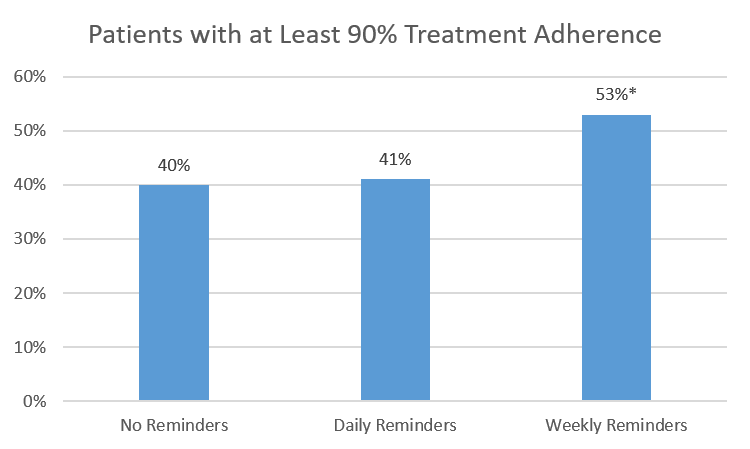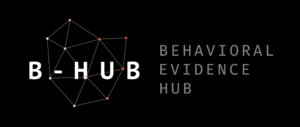
“This is Your Reminder.” Text Messages for Treatment
Organization : B-Hub Editorial Team
Project Overview
Project Summary
To increase treatment adherence, regular text messages were sent to HIV patients in rural Kenya reminding them to take their medication.
Impact
Weekly SMS reminders increased patient adherence to medication by 13 percentage points, from 40% to 53%.
Challenge
Although antiretroviral therapy (ART) has significantly reduced HIV/AIDS morbidity and mortality, adherence to treatment remains a pressing challenge. In Sub-Saharan Africa, patient adherence has been found to decline over time, which increases risks for treatment failure. When initial treatment fails, second-line therapy can be costly, or at times, unavailable. SMS messaging offers a feasible, cost-effective approach to increasing adherence in geographically dispersed and resource-limited settings.
Design
Researchers partnered with a rural health center in Kenya to assign patients who had started ART within the past 3 months to either a control group (no reminders) or one of four reminder message groups. Over 48 weeks, participants in the message groups were sent regular SMS reminders to take their medication. Reminders were either sent daily or weekly, and in one of two forms: short or long (attached below). The short messages were meant as a simple reminder while the long messages were meant to provide additional social support.

Because only 45% of the participants had cell phones at the beginning of the study, individuals without phones were provided phones for the duration of the study. Antiretroviral medication bottles were equipped with electronic caps that recorded bottle openings to monitor adherence.
Impact
A randomized evaluation found that weekly SMS reminders increased adherence (of at least 90% throughout the study) by 13 percentage points on average, from 40% to 53%. Participants who received weekly reminders were also less likely to experience any treatment interruptions lasting more than 48 hours compared to the control group (81% compared to 90%). Daily reminders and length of message had no effect on treatment adherence.

* Significantly different from no reminders (p<.05)
Implementation Guidelines
Inspired to implement this design in your own work? Here are some things to think about before you get started:
- Are the behavioral drivers to the problem you are trying to solve similar to the ones described in the challenge section of this project?
- Is it feasible to adapt the design to address your problem?
- Could there be structural barriers at play that might keep the design from having the desired effect?
- Finally, we encourage you to make sure you monitor, test and take steps to iterate on designs often when either adapting them to a new context or scaling up to make sure they’re effective.
Additionally, consider the following insights from the design’s researchers:
- Messages intentionally did not mention HIV or ART to maintain confidentiality of the participant’s HIV status.
- To monitor when medication was taken, this study used an electronic cap which was scanned monthly by pharmacy staff to track usage.
- Telecommunication coverage is required in the area of intervention. In regions where cell phones are not regularly used, providing more patients will cell phones may increase the costs of the intervention. Since less than half of participant households in this study reported cell phone ownership, all participants were provided with a cell phone for the duration of the study.
- Medication doses in this study were taken twice a day. If a treatment is only needed once a week, weekly reminders (at dosing times) might lead to habituation, or a reduced response to a frequently repeated stimulus, diminishing the effects of reminders.
- Total costs include cell phone provision, SMS sending fees, and financial support to participants for phone charging and credit (less than $1.50/month per patient). Financial support for participants was to offset costs of remaining in the study. A commercial provider of standardized SMS allows for predetermined messages to be sent on a regular schedule.
Project Credits
Researchers:
Cristian Pop-Eleches Columbia University
Harsha Thirumurthy The World Bank
James P. Habyarimana Georgetown University
Joshua G. Zivin University of California, San Diego
Markus P. Goldstein The World Bank
Damien de Walque The World Bank
Leslie MacKeen USAID
Jessica Haberer Massachusetts General Hospital
Sylvester Kimaiyo Moi University
John Sidle Indiana University
Duncan Ngare Moi University
David Bangsberg Ragon Institute of MGH


